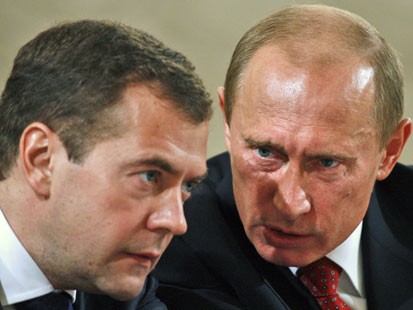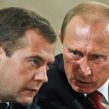
ANALYSTS EXPECT A POWERFUL PRIME MINISTER AND A WEAK PRESIDENT IN RUSSIA
Publication: Eurasia Daily Monitor Volume: 5 Issue: 67
By:

State Duma Speaker Boris Gryzlov, who also heads United Russia, has confirmed rumors that outgoing President Vladimir Putin will be picked as the party’s new leader during a party congress scheduled for April 14 and 15 (see EDM, March 28).
“If Vladimir Vladimirovich Putin heads United Russia, it will be the best variant,” Gryzlov said in a press conference on April 7. Gryzlov indicated that he himself would formally nominate Putin as his replacement in the post. “Vladimir Putin was present at the creation of United Russia. Our party is always beside Putin. . . . I can make that proposal myself at the congress. It would be the right thing to do” (Kommersant, April 8).
As Kommersant noted, becoming leader of the party that holds a constitutional majority in the State Duma and controls the lion’s share of regional parliaments would give Putin the power to decide a number of important issues, including that of increasing the interval between Russia’s parliamentary and presidential elections, something Putin spoke in favor of during a meeting with cabinet members last December. In his April 7 press conference, Gryzlov said that the ideal interval between presidential elections would be two years rather than the current four years.
Perhaps equally significant were the comments of Liberal Democratic Party of Russia (LDPR) leader Vladimir Zhirinovsky, who many observers believe is frequently used by the Kremlin, or at least Kremlin factions, to float ideas. Zhirinovsky said that one option for widening the interval between parliamentary and presidential elections would be to “extend parliament’s term in office from four to five years and the presidential term in office to seven years.” The other option, Zhirinovsky said, would be to hold preterm presidential elections in 2009. “If the United Russia members don’t want to touch the constitution, then they will probably go for early presidential elections,” the LDPR leader said (Kommersant, April 8). This would effectively mean cutting Dmitry Medvedev’s presidency short by two years, given that presidential elections would almost certainly return Putin to the Kremlin.
Tatyana Stanovaya, head of the analytical department of the Center for Political Technologies, suggested that one of the feuding Kremlin clans – presumably the siloviki who reportedly opposed the choice of Medvedev as successor and wanted Putin to stay on for a third term – sees preterm presidential elections as one way of reversing their defeat. “Similar statements by Zhirinovsky are traditionally considered as ‘signaling’; they are interpreted as expressions of certain intra-Kremlin disputes,” she wrote. “The appearance in a public forum of scenarios calling for preterm presidential elections as early as 2009 can . . . be regarded as an attempt by part of the Putin entourage to win back the ‘successor’ scenario” (Politcom.ru, April 8).
Vladimir Pribylovsky, head of the Panorama think tank, said that Dmitry Medvedev’s preterm resignation as president was politically possible but not necessary as early as 2009, unless Medvedev and Putin had some sort of agreement to this effect. “Within the next year it will become clear whether Medvedev’s term in office will be shortened,” Pribylovsky said. “It is possible if power is really tipping toward Medvedev. A number of clans are already now committing disloyal acts towards the FSB [Federal Security Service], and that means towards Putin, hoping for changes in the configuration of power. Putin may not like this and he may force events” (Kommersant, April 8).
The talk about Vladimir Putin replacing State Duma Speaker Boris Gryzlov as head of United Russia and the possibility of preterm presidential elections came on the heels of Gryzlov’s announcement that the Duma would be ready to confirm Putin as prime minister on May 8, that is, just one day after Medvedev is inaugurated as president, and would do so without prior consultations with the Kremlin over the nomination (see EDM, April 2). Such a quick confirmation of Putin as prime minister without prior consultations with parliamentary leaders would underscore Putin’s status as “national leader,” said Dmitry Oreshkin, head of the independent Mercator Group.
“The new president Dmitry Medvedev is being assigned narrow bounds: the first thing expected from him is a decree naming Putin as prime minister,” said Oreshkin. “If Medvedev does not introduce his [Putin’s] candidacy into the Duma, then that can be regarded as a game against the rules: subordination, opposition. Parliament is also being shown how it should act. Putin’s status as national leader is not to be discussed. Why does the head of the government need to be confirmed with such haste? Can’t [Prime Minister] Viktor Zubkov work in that capacity a little while longer, or is he performing badly? Of course, something else is at issue: All of this pure symbolism in bureaucratic language. Those who understand it are given a clear answer to the question of which of the two leaders of the country will be the chief. After May 7, we will have a president very limited in his actions and a premier very powerful in the sphere of realpolitik” (Vremya Novostei, April 8).




